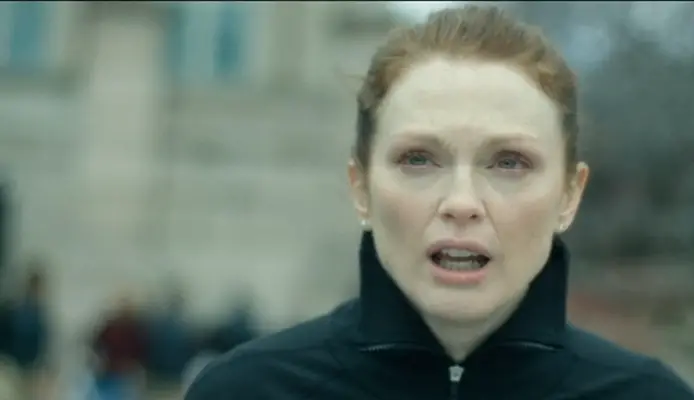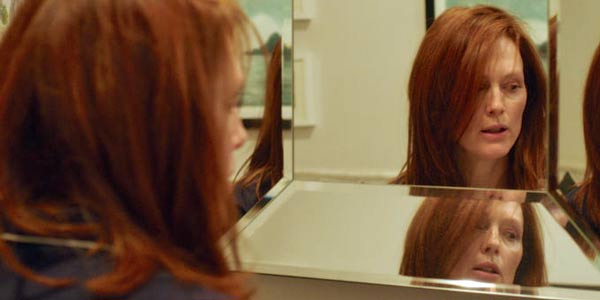STILL ALICE: An Incredibly Warm-hearted Film

Alistair is a 25 year old writer based in Cambridge.…
It’s often stated that January and February are the two worst cinematic months of the year, as all of the major new releases are more often than not the terrible movies major studios have just “dumped” there. Yet it could easily be argued that the months leading up to the end of the year (“awards season” or “prestige season”, if you prefer to forget that Hollywood backslapping ceremonies exist) are equally bad. They do usually provide the year’s best movies, yet they also provide the kinds of movies that have been made cynically to get awards.
This year, the “cynical awards-bait” genre has been solely cornered by The Theory of Everything, a movie that I feel like I am alone in not only not loving, but actively hating. The worst feature in that movie is that they have a non-disabled actor playing the role of a disabled person, which always comes across as offensive and cynical to me. Yet it allows actors to overact in a way that all but guarantees that they will need to make some room on their mantelpieces for awards.
Julianne Moore: An actress so good this isn’t even her best performance this year
The most remarkable thing about Still Alice is how it both embraces the heart-warming, tear-jerking aspects of these crowd-pleasing movies, yet doesn’t share their cynical awards-courting insincerity. Yes, it has a major actress playing a character with Alzheimer’s; luckily, that actress is Julianne Moore, a mercurial screen presence who underplays scenes any other actress would overplay in a way that might as well have “for your consideration” permanently etched into the bottom of the screen.
It may be this downplaying that has resulted in this being her first ever Oscar win, which is shocking considering how her entire career has consisted of great performances. Moore is a great actress to the point that this isn’t even her best role of the year, although I somehow doubt that Hollywood would want to give recognition for her darkly satirical lead role in David Cronenberg’s black comedy Maps to the Stars.

Here, Moore plays Alice, a successful university lecturer who lives a happy life with her equally successful husband (Alec Baldwin, taking the rare opportunity to play a compassionate character). She’s been forgetting a lot of things recently, and after repeat trips to the neurologist she discovers that she has early signs of Alzheimer’s, rare for somebody of her age. Initially, her husband rejects this; after all, he forgot the word “glucose” the other day, so surely she’s just equally forgetful? Unfortunately, not only is she diagnosed, but her symptoms are hereditary, meaning her three children (a surprisingly good Kristen Stewart, Kate Bosworth and Hunter Parrish) stand a chance of having the disease. What follows is undeniably melodramatic, but seals the family unit together in a way that registers as completely believable.
As the movie hasn’t been receiving attention outside of Moore’s central performance it would be easy to assume that it is a cynical awards-courting movie that disguises any emotional truths under layers of dewey-eyed schmaltz. In actuality, the movie is a deeply human work that cares about its characters and it proves to be infectious. Even a cynic like me was struggling to hold back the tears at certain points. This isn’t because it’s emotionally manipulative (the heart strings-tugging score is by far the worst aspect of the movie) but because it’s grounded in well-rounded characters who I couldn’t help but empathize with.

This is one of the most compassionate big-screen accounts of the illness to date
Naturally, the biggest comparison for the film is Michael Haneke’s 2012 drama Amour, which was also a surprise awards front-runner a few years back. That film depicted an elderly Parisian couple (Emmanuelle Riva and Jean-Louis Trintignant) whose love for each other was tested by the wife’s sudden development of Alzheimer’s and her worryingly fast mental deterioration. Haneke’s film was remarkable in that it never over-exaggerated the emotion, using techniques as simple as refusing to have a film score to ensure it stayed as truthful as possible. For me, it was a little too truthful; it’s clearly a great film, but one I will refuse to watch again due to a seemingly cold-heart and an indifference to its characters.
Still Alice is only different in that Alice’s mental state takes longer to fully collapse, yet it still feels emotionally truthful. It has an incredibly warm heart. While Haneke’s film had better acting performances overall, the fact that it felt free of compassion means that it’s a rare case of the Hollywood movie being a far more worthwhile watch than the European arthouse effort on the same subject. Another comparison is that it doesn’t end on an obvious heart-strings tugging moment; the ending to Amour is borderline unbearable to watch as it comes to the natural conclusion, whereas Still Alice ends on a seemingly innocuous scene that has far greater emotional depth the more you think about it.
However, the film is far from perfect
The movie as a whole is so compassionate towards its characters, to the point that the only things I found to be wrong are little details about the characters that can be easily nit-picked. For example, Alice is a successful professor of linguistics at Columbia University, which is established by her giving a lecture in a scene that a certain type of viewer will regard as the obvious weak-spot, whereas others won’t see any problem. You see, she’s giving a lecture on her ground-breaking studies in the early development of language in babies, something that I actually had to write an essay about in high school five years ago.
Every time scientists complain about their science being inaccurate in movies, all I can do is shrug my shoulders. I don’t have a firm grasp of scientific knowledge, so it usually goes over my head in movies. Here, my choice to study English Language in high school has really paid off, as I get to inform you that Alice’s studies aren’t ground breaking, but common knowledge and simplistic to the point that it seems to be the first thing the screenwriters came across when they were googling “child speech patterns.”

By saying that its only tiny details that are wrong with the movie, you may assume that I thought it was a near-perfect piece of work. Actually, the movie is so remarkably free of any directorial stamp (Richard Glatzer and Wash Westmoreland are the writer/directors here, making this their first big break-out after a decade of mixed success at independent film festivals), the best I can describe it is being as enjoyable as a movie can be while remaining merely competent.
The pair have managed to adapt the novel of the same name into a similarly heart-warming movie, but with the exception of getting great performances from the cast, haven’t done much to distinguish themselves as directors to watch out for in the future. There isn’t anything wrong with being “actor directors,” solely relied upon to help actors deliver their best performances; but the lack of any sort of authorial trademark on the movie does give the feeling it could have been directed by anybody.
Overall, Still Alice is a close-to-heartbreaking portrait of mental illness and a genuinely effecting character study. Julianne Moore’s performance may be getting all the recognition, but this is truly a story about an entire family; one whose ordinariness makes it all too believable.
Still Alice is out now in the US and out in the UK on March 6. All other release dates can be found here.
Do you think Julianne Moore deserves her Oscar? And what do you think are her best performances?
(top image source: Sony Pictures Classics)
Does content like this matter to you?
Become a Member and support film journalism. Unlock access to all of Film Inquiry`s great articles. Join a community of like-minded readers who are passionate about cinema - get access to our private members Network, give back to independent filmmakers, and more.
Alistair is a 25 year old writer based in Cambridge. He has been writing about film since the start of 2014, and in addition to Film Inquiry, regularly contributes to Gay Essential and The Digital Fix, with additional bylines in Film Stories, the BFI and Vague Visages. Because of his work for Film Inquiry, he is a recognised member of GALECA, the Gay & Lesbian Entertainment Critics' Association.













